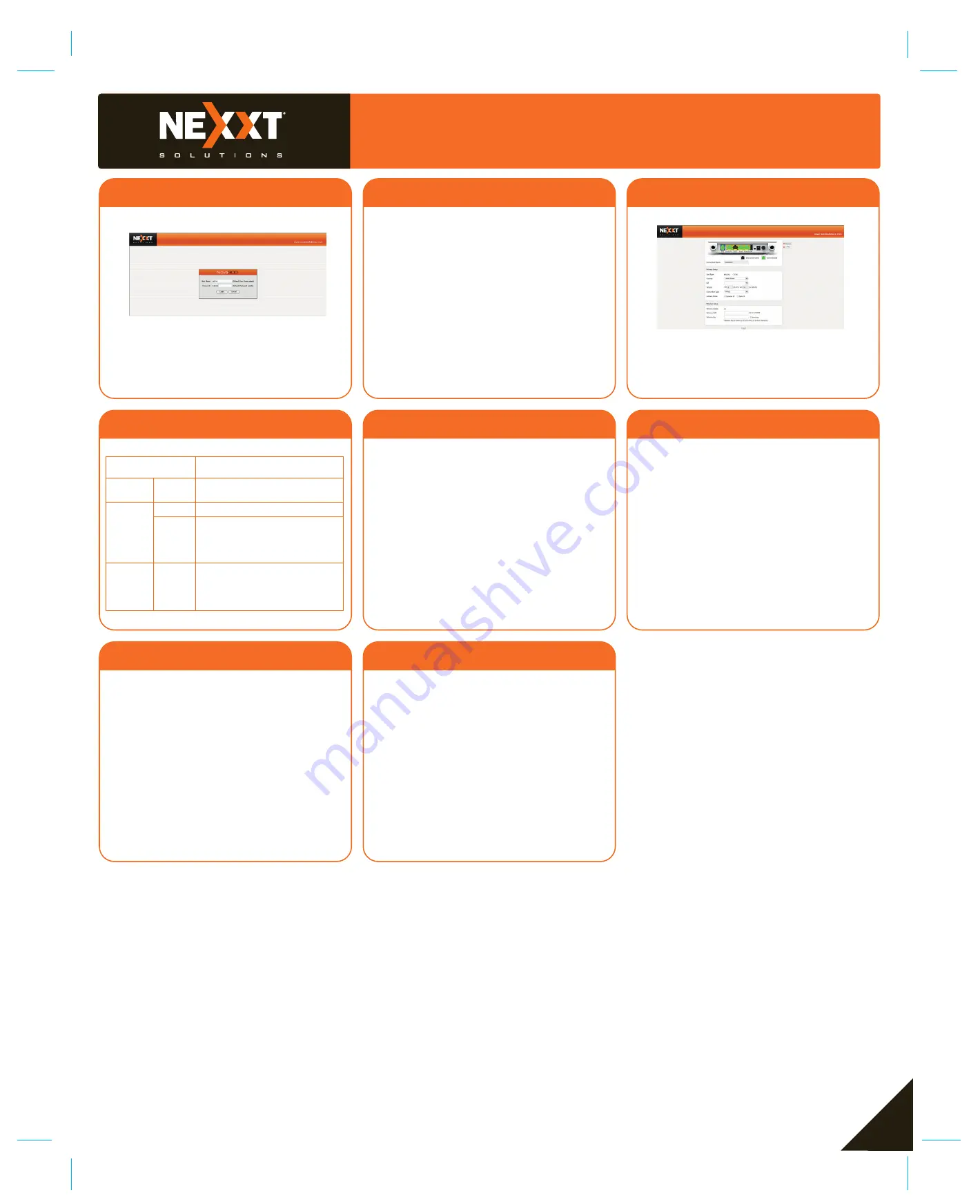
When you access the internet setup window for the
first time, you will need to fill in the corresponding
fields, using your ISP service provider parameters.
Link type: ensure ADSL is selected
Select your country
Select your ISP
VPI and VCI fields will be populated automatically
if the correct country and ISP are selected
Select your internet connection type
3.
Your basic wireless configuration settings are required
at this stage. By default, the SSID is Nexxt_XXXXXX
(whereby the “X” represents the last six digits of the
router’s MAC address). There is no default password,
only a predetermined sequence that will be applied
automatically. If the user chooses not to type one of his
own. The sequence is
1234567890
.
Remember that those two last parameters can be
later replaced by user-defined values, if desired. Also,
for security considerations, we strongly recommend
customizing your wireless security key. This can be
accomplished by accessing the
Advanced
settings
menu.
After all the above settings have been configured, click
OK
. Your new configuration will be saved in the system
in order to take effect.
Depending on the connection type, you are prompted to
enter your ISP settings, as shown in the following table.
4.
Quick Installation Guide
13
14
2
16
17
18
15
3
19
20
This device complies with Part 15 of the FCC Rules.
Operation is subject to the following two conditions:
(1) This device may not cause harmful interference,
and (2) this device must accept any interference
received, including interference that may cause
undesired operation.
This equipment has been tested and found to comply
with the limits for a Class B digital device, pursuant to
Part 15 of the FCC Rules. These limits are designed to
provide reasonable protection against harmful interfer-
ence in a residential installation. This equipment
generates, uses and can radiate radio frequency
energy and, if not installed and used in accordance with
the instructions, may cause harmful interference to
radio communications. However, there is no guarantee
that interference will not occur in a particular installa-
tion. If this equipment does cause harmful interference
to radio or television reception, which can be
determined by turning the equipment off and on, the
user is encouraged to try to correct the interference by
one of the following measures:
FCC Statement
Reorient or relocate the receiving antenna.
Increase the separation between the equipment and
receiver.
Connect the equipment into an outlet on a circuit
different from that to which the receiver is connected.
Consult the dealer or an experienced radio/TV
technician for help.
•
•
•
•
If you change the login user name and password, but
forget them later, you can press the
Reset
button to
restore the device to its factory default settings.
Note:
a.
b.
c.
d.
e.
Internet
connection type
Dynamic IP
Enter the ISP login user name and
password. If you cannot locate this
information, ask your ISP to provided it.
Enter the assigned IP address, subnet
mask, and the IP address of your ISP’s
primary DNS server. This information
should have been provided to you by your
ISP. If a secondary DNS server address is
available, enter it also.
Enter the assigned IP address, subnet
mask, and the IP address of your ISP’s
primary DNS server. This information
should have been provided to you by
your ISP. If a secondary DNS server
address is available, enter it also.
Static
(fixed) IP
Static
(fixed) IP
No entries needed.
ISP information
PPoE,
PPPoA
IPoE
IPoA
5.
6.
7.
The Internet LED will glow solid orange at this point.
This indicates that an internet connection has been
successfully established with your device.
At the top of the main settings page, you will also
notice a graphical representation in real time of the
modem/router’s port connections. When a port is
represented with a green jack, it means that there is
an active connection in that particular input. If the port
appears to be black, it means that there is nothing
linked to that particular access point.
8.
9.
FCC ID:
X4YNOVA3


